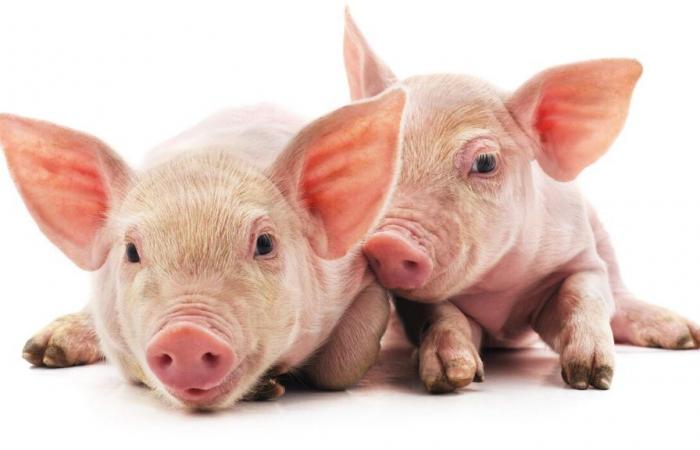The federal government wants to facilitate the marketing of cloned cattle and pigs by eliminating the obligation to declare and assess risks. Health Canada says that meat and milk resulting from cloning are safe, but the food industry and Quebec agricultural producers are not reassured.
The update of the federal policy was done so discreetly this spring that neither the Union of Agricultural Producers (UPA) nor the Food Transformation Council of Quebec (CTAQ) were informed.
In a letter addressed to Health Canada on May 24, at the very end of the public consultation, theUPA regrets not having been invited to the consultation.
She writes that he is premature to remove monitoring and traceability devices for these foods
et essential to maintain the current version of the policy
.
Open in full screen mode
A Canadian consumer will not be able to know if the pork or beef they buy is the result of cloning.
Photo : Radio-Canada / Ivanoh Demers
Agricultural producers are concerned that Canadian meat and dairy products can no longer be exported to certain countries. For example, the European Union has banned the cloning of farm animals since 2015.
It is essential and necessary to take into consideration […] the confidence of consumers here and elsewhere, who will no longer be able to differentiate products from cloned animals from those from animals that are not.
Reproductive cloning produces almost identical copies of animals. It makes it possible to accelerate the distribution of the genetic heritage of individuals possessing superior or rare traits, which can contribute to product quality or increase disease tolerance.
Open in full screen mode
Aside from beef and pork, foods derived from other cloned animals, for example sheep or goats, will continue to be considered “novel foods” and will require a safety assessment. before marketing.
Photo : getty images/istockphoto / Jag_cz
Health Canada worked with the Canadian Food Inspection Agency and Environment Canada to establish its new policy. The federal government says its proposal will in the same way
than other countries such as the United States, Japan and New Zealand.
Foods derived from cloned healthy cattle and pigs and their progeny are as safe and nutritious as foods derived from traditionally raised animals.
Most cloned animals will be used primarily as breeding stock
explains Health Canada, and their elimination in the human and animal food chain will take place later in the animal’s life, well after the normal age of slaughter
.
Open in full screen mode
The government reminds that meat or dairy products resulting from the cloning of cattle and pigs must respect the same health standards applicable to other foods on the market.
Photo : Radio-Canada
To propose this reform, Ottawa is relying on a 150-page scientific opinion, produced by its officials, which concludes that foods resulting from reproductive cloning are safe. But reading the same document did not reassure theUPA.
She writes in her letter that the results on which Health Canada relies to justify updating the current policy prove to be insufficient and not significant
and she demands that we apply the precautionary principle
.
Current knowledge and available data on the risks that these foods may represent for human and animal health as well as for the environment are limited and are based on studies with small sample sizes and a non-standardized approach.
Open in full screen mode
Martin Caron, general president of the Union of Agricultural Producers of Quebec.
Photo: Radio-Canada / Guylaine Bussiere
Health Canada itself notes, the limited number of animals studied to date
and writes that his opinion is not not a complete assessment of the potential impacts of these technologies
.
Much less information is available about the long-term effects on health and fertility of cloned animals.
can we read in the notice, because it is a relatively new technology, so few clones reached the later stages of their normal life expectancy
.
The sheep Dollythe first mammal cloned by somatic cell nuclear transfer (SCT), was euthanized at the age of six (about half the expected lifespan for her breed of sheep) after developing a respiratory disease.
Open in full screen mode
The first cloned sheep presented was presented to the media in February 1997.
Photo : Reuters
Health problems in cloned animals
Although healthy cloned cattle and pigs have been produced using TNCS technologies, Health Canada’s scientific advisory notes that problems are associated with TNCS cloning of animals, including lower rates of reproductive success, changes in birth weight, and higher rates of organ failure
.
Moreover, the origins and mechanisms underlying these problems are not fully understood
the federal government agrees, while concluding that there are no risks for human food.
What reassures the government is that According to empirical findings, there are no known significant differences between the offspring of SCNT cloned animals and those of other sexually reproduced animals with respect to their health status.
.
Open in full screen mode
The most common method of cloning involves removing the genetic material from an unfertilized egg and replacing it with the complete genetic material of the animal to be cloned (the donor animal). The egg is then implanted into a surrogate mother who gives birth to an animal that is a clone of the donor animal. The cloned animal is then mated with other animals to pass on the desired characteristics.
Photo: Health Canada
The European Union is more cautious
Like Health Canada, the European Food Safety Authority does not conclude that there are differences between meat and milk obtained from cloned animals and those derived from traditionally bred animals. Its scientific opinion specifies that this conclusion is, however, based on the assumption that meat and milk are obtained from healthy animals, subject to food safety rules and adequate controls
.
Or, it appears that, in a significant proportion of cloned animals (…), health and well-being were severely impaired, often with serious or even fatal consequences
.
Other potential genetic effects of cloning have been examined by the European Union, including the extent to which TNCS would induce silent mutations inADN nuclear clones that could be passed on to future generations.
Open in full screen mode
Canadian Prime Minister Justin Trudeau and European Commission President Ursula von der Leyen, in 2023.
Photo: Associated Press / Geert Vanden Wijngaert
Furthermore, the European Group on Ethics in Science and New Technologies (EGE) is of the opinion thatGiven the current level of suffering and health problems experienced by surrogate mothers and cloned animals, the group doubts that animal cloning for food purposes is ethically justified
.
At present, the EGE does not see a convincing argument to justify the production of food from cloned animals and their offspring.
Questioned by Radio-Canada, the Quebec Ministry of Agriculture, Fisheries and Food (MAPAQ) preferred not to comment. The department has taken note of Health Canada’s proposal and is currently analyzing the proposed direction.
replies spokesperson Yohan Dallaire Boily.
As for the Food Transformation Council of Quebec (CTAQ), it was informed by Radio-Canada of this reform project. The vice-president of technical and regulatory services, Christine Jean, writes to us: At first glance, we are concerned, not only about the impact on the food processing industry (which was not consulted) but particularly on consumers and export markets.
Open in full screen mode
The first living cloned animals were created within the last 20 years.
Photo: University of Alberta / Melanie Buckler
Health Canada did not want to respond to the concerns expressed. The Ministry is working to review the comments submitted
we are told.
The case recalls the controversial issue of GMO seeds that Ottawa also wants to exempt from safety evaluation and mandatory declaration, which puts organic products at risk. Last year, a Radio-Canada investigation revealed that agrochemical industry lobbyists worked hand in hand with federal officials to prepare this reform.
As with GMO seeds, cloned animals represent an economic windfall.
In 2000, the bull Holstein Starbuck II was the first cloned mammal born in Canada, thanks to the work of researchers at the University of Montreal. It was a clone of the famous Holstein bullHanoverhill Starbuck qui was the father of some 200,000 females spread across 45 countries. At the time of his death in 1998, Starbuck had a total estimated market value of over $25 million to the industry.
With the collaboration of Aude Garachon






